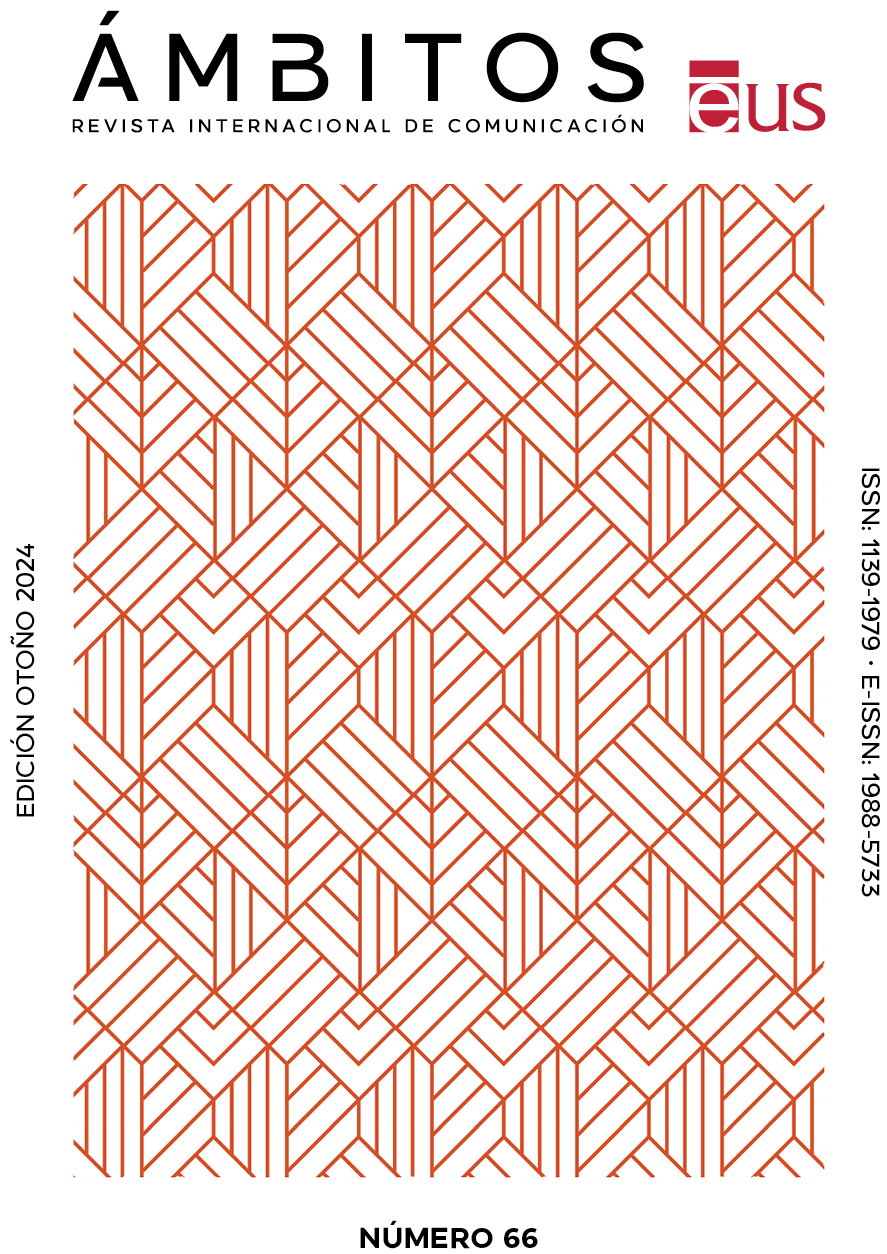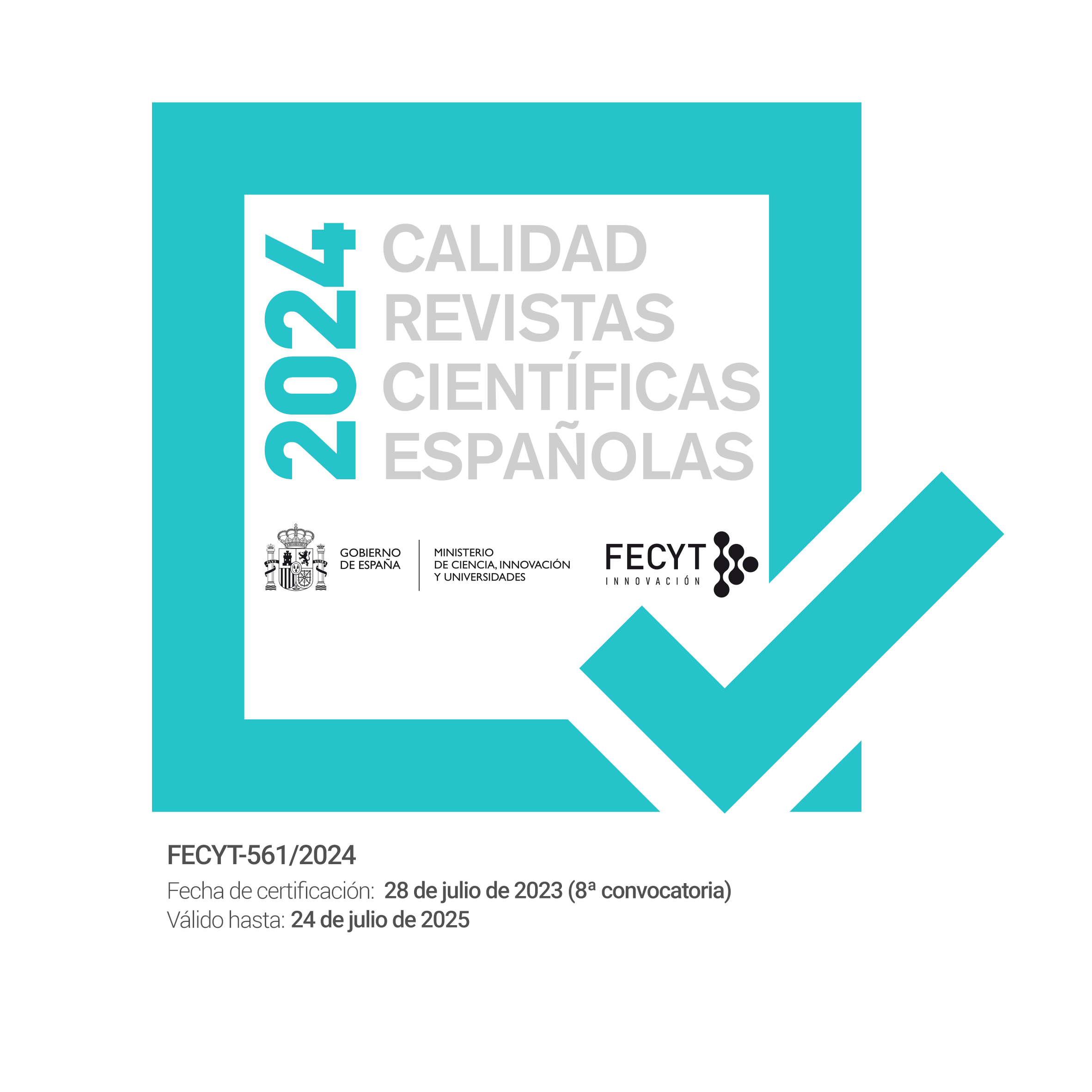WhatsApp in regional journalism: a study based on the perception of journalists from Palmas (TO)
DOI:
https://doi.org/10.12795/Ambitos.2024.i66.04Keywords:
WhatsApp, local news, journalism, TocantinsAbstract
This article aims to understand how journalists working for traditional media outlets in the city of Palmas, the capital of Tocantins1 (Brazil), use the WhatsApp application to develop regional news coverage. To achieve this, semi-structured interviews were conducted with ten journalists - seven from TV Anhanguera (affiliated to Rede Globo) and three from CBN Tocantins radio - between July and September 2023. The study’s theoretical framework includes considerations about regional journalism and the presence of WhatsApp in Brazilian newsrooms. The results of this research show that WhatsApp contributes significantly to the production of daily content about cities near and far from newsroom headquarters without the need for teams to travel. On the other hand, it was observed from the interviews that the app overloads journalists’ work routines, as they have to participate in a large number of news groups from other municipalities in order to capture and compile regional information in circulation. In terms of content, the regional news produced via the app is increasingly devoid of journalists’ perceptions, due to this lack of face-to-face investigation; distant from the places where these events take place; and far removed from the people they are talking about.
Downloads
References
Aguiar, S. (2016). Territórios do jornalismo: Geografias da mídia local e regional no Brasil. Vozes. Editora PUC-Rio.
Boczek, K., & Koppers, L. (2020). What’s new about WhatsApp for news? A mixed-method study on news outlets’ strategies for using WhatsApp. Digital Journalism. https://bit.ly/4btx6jA.
Bueno, T. C., Assunção, T. A., & Lacerda, L. (2021). WhatsApp na rotina de trabalho dos jornalistas maranhenses: Um estudo nas redações de Imperatriz. Pauta Geral, 8(2), 1-21. https://bit.ly/4cObWO4.
Deolindo, J. (2013). Cidade e indústrias de mídia: Distinções entre metrópole e interior. Em Anais do XIII Simpósio Nacional de Geografia Urbana. UERJ.
Duarte, J. (2005). Entrevista em profundidade. Em J. Duarte & A. Barros (Orgs.), Métodos e técnicas de pesquisa em comunicação (pp. 62-83). Atlas.
Fadul, A., & Moreira, S.V. (2019). O generoso guarda-chuva das Geografias da Comunicação. Em S. V. Moreira; M. J. Baldessar; D. Ota; R. Brandalise (Orgs.), 10 anos: O percurso do grupo de pesquisa Geografias da Comunicação no Brasil (pp. 7-8). Intercom.
Jenkins, H. (2009). Cultura da convergência. Aleph.
Jerónimo, P., & Esparza, M. S. (2023). Jornalistas locais e fact-checking: Um estudo exploratório em Portugal e Espanha. Comunicação e Sociedade, (44), 1-18. https://bit.ly/4cJg2Hl.
Lima, S. C. (2022). O uso do WhatsApp como fator de mudanças no trabalho dos jornalistas, no jornalismo e na identidade profissional. [Dissertação de Mestrado, Universidade do Estado do Rio de Janeiro]. Repositório Institucional UERJ. https://bit.ly/4ciIEY9.
Martinez, A. G. (2010). A construção da notícia em tempo real. Em P. Ferrari (Org.), Hipertexto, hipermídia: As novas ferramentas da comunicação digital. Contexto.
Meireles, I. L. P., & Coêlho, T. F. (2014). O uso do WhatsApp nas rotinas produtivas do portal O Tempo. Em Simpósio Nacional da ABCiber. São Paulo.
Projor - Instituto para o Desenvolvimento do Jornalismo. (2024). Atlas da Notícia. https://bit.ly/3xIW00K.
Peruzzo, C. M. K. (2003). Mídia local, uma mídia de proximidade. Comunicação Veredas: Revista do Programa de Pós-Graduação em Comunicação, 2(2), 65-89. UNIMAR.
Peruzzo, C. M. K. (2005). Mídia regional e local: aspectos conceituais e tendências. Comunicação & Sociedade, 1(38), 67-84. https://bit.ly/3W8CNix.
Reino, L. S. A., & Bueno, T. C. (2017). Ciberjornalismo em dispositivos móveis: Uma análise da conjuntura brasileira. Questões Transversais, 5(10). https://bit.ly/3La1STP.
Reis, T. A. (2018). Jornalismo regional: Uma leitura a partir dos critérios de noticiabilidade do jornal O Progresso. Estudos de Jornalismo e Mídia, (15), 62-72. https://bit.ly/3zm6LXd.
Reis, T. A. R. (2022). A cidade de notícias: Um estudo do jornalismo de influência regional de Imperatriz no Maranhão (Tese de doutorado). Universidade do Estado do Rio de Janeiro, Rio de Janeiro. https://bit.ly/3xFt61D.
Reis, M. A., & Thomé, C. A. (2017). Um olhar sobre o papel do WhatsApp nas redações dos principais jornais do Rio. Rio de Janeiro. https://bit.ly/3LcnjE0.
Rocha, L. V. (2017). A mídia regional na era on-line: Mapeamento dos sites e blogs jornalísticos no Estado do Tocantins. Em 40º Congresso Brasileiro de Ciências da Comunicação. Intercom, 1-14. https://bit.ly/3XRm9Fu.
Salaverría, R., & Negredo, S. (2008). Periodismo Integrado. Convergencia de Medios y Reorganización de Redacciones. Editorial Sol 90.
Santos Filho, J. F., Teixeira, J. F., & Dourado, J. L. (2020). O uso do WhatsApp nas redações dos portais 180 Graus e Meio Norte como instrumento para a acumulação de capitais. Comunicologia - Revista De Comunicação Da Universidade Católica De Brasília, 13(1), 119 - 136. https://bit.ly/3LdDu3P.
Specht, P. P. (2019). O WhatsApp no Extra (RJ) e no Diário Gaúcho (RS): A participação da audiência na reconfiguração do processo de produção da notícia. [Tese de Doutorado, Pontifícia Universidade Católica do Rio Grande do Sul]. Repositório Institucional PUCRS. https://bit.ly/4bv2n5u.
Published
How to Cite
Issue
Section
License
Copyright (c) 2024 Fernanda Alves de Mendonça, Thays Assunção Reis

This work is licensed under a Creative Commons Attribution-NonCommercial-ShareAlike 4.0 International License.
Ámbitos. Revista Internacional de Comunicación is an open access journal, which means that all content is freely available at no charge to the user or their institution. Users may read, download, copy, distribute, distribute, print, search or link to the full text of articles, or use them for any other lawful purpose, without seeking prior permission from the publisher or author. This definition of open access is in accordance with the Budapest Open Access Initiative (BOAI).

Unless otherwise noted, all content in the electronic edition is distributed under a "Creative Commons Attribution-NonCommercial-ShareAlike 4.0 International License". You can consult the informative version and legal text of the licence here. This should be expressly stated in this way where necessary.
In case of acceptance of the manuscript, the authors cede the rights of the work for its publication to Ámbitos. Revista Internacional de Comunicación under the Attribution-NonCommercial-ShareAlike 4.0 International license contract (CC BY-NC-SA 4.0). The authors retain copyright and third parties are authorised to copy, distribute and make use of the work, provided they comply with the terms and conditions set out in the licence
- Cite the authorship and the original source of publication (journal, publisher and URL of the work).
- Do not use them for commercial purposes.
- If you remix, transform or create from the material, you must release your contributions under the same license as the original.
More information can be found at https://creativecommons.org/licenses/by-nc-sa/4.0/deed.es


















